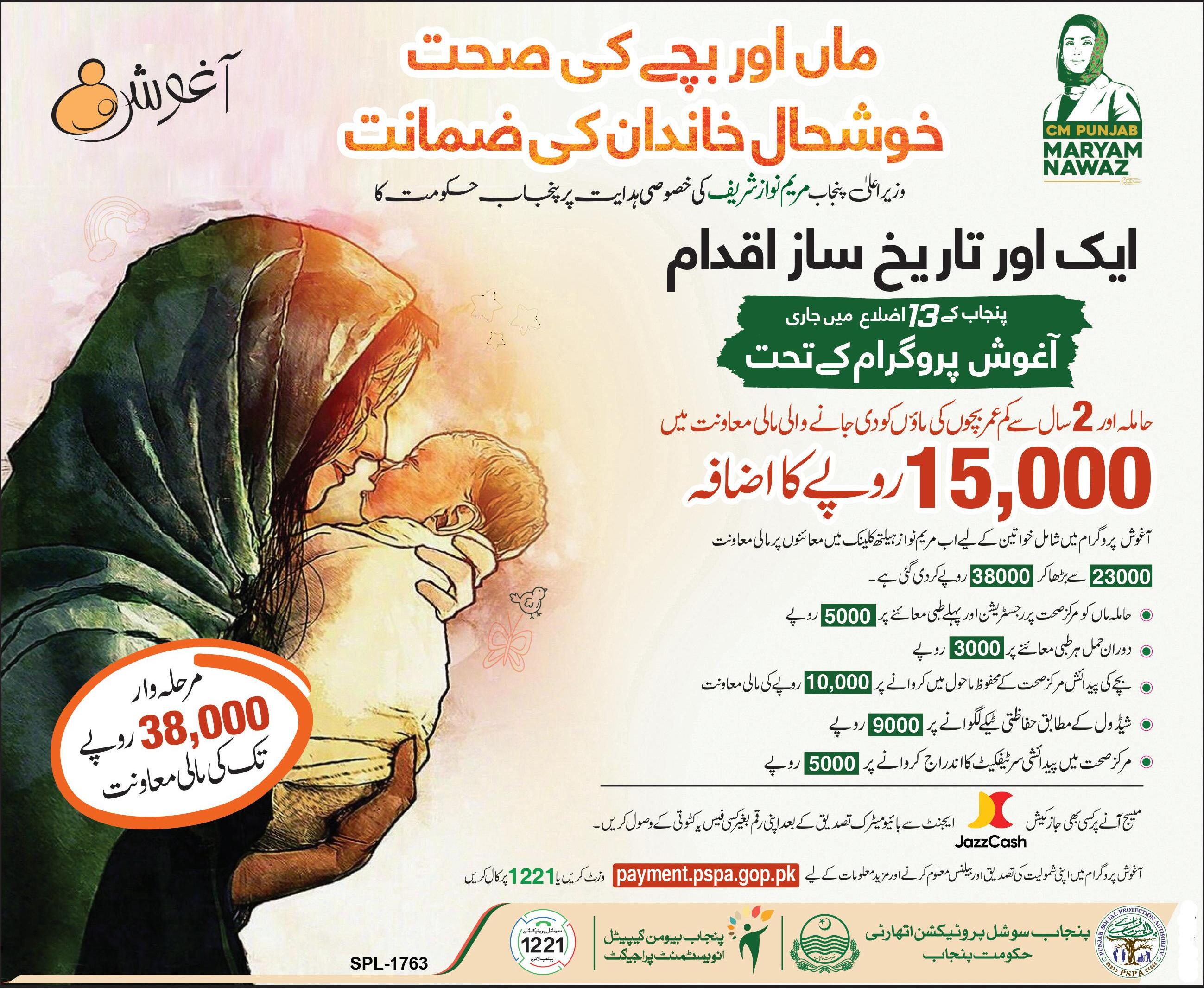

FOUR TERRORISTS KILLED AS 10 MART YRED, 32 INJURED IN QUETTA BL AST NEAR FC HQ
g EMERGENCY DECLARED AND ALL QUETTA HOSPITALS PUT ON HIGH ALERT TO TREAT INJURED, HEALTH MINISTER CONFIRMS TOLL
g CONDEMNATIONS POUR IN PRESIDENT, PM, UN, US AND RUSSIA DENOUNCE ‘ HEINOUS ACT OF TERROR ’

Ishaq D ar, S audi counterpar t confer on G aza crisis
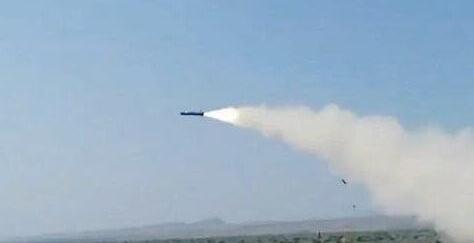

Air

reiterated its commitment to promoting free competition enhancing economic efficiency and protecting consumers from anti-competitive behavior Stakeholders are encouraged to report violations or non-compliance with exemption conditions via CCP’s online complaint portal at www cc gov pk or by submitting written complaints to the Commission

OGRA c uts LPG price by Rs79 for Oc tober

KSE-100 hits new all-time high amid IMF talks
Kazakhstan the minister said the Islamabad–Tehran–Istanbul road link held critical importance for Pakistan as well as the entire region He added that the China–Pakistan Economic Corridor (CPEC), aligned with the Belt and Road Initiative, was central to Pakistan’s vision of achieving self-reliance and sustainable economic growth by 2030 He further noted that CPEC was fully integrated with other regional corridors including the ECO and SCO initiatives Pakistan s membership of the TIR system and the Quadrilateral Transit Agreement, he said, marked a milestone for regional connectivity Aleem Khan stressed that turning international transport corridors into “pathways of peace and prosperity is a shared responsibility ” though customs regulations and visa restrictions continue to impede regional integration He also highlighted the strategic importance of Eurasia calling it the world s largest landmass and reaffirmed Pakistan s readiness to play its role across South Asia, the Middle East, and Central Asia
The Forum attended by transport ministers from 12 countries including Türkiye, Iran, Uzbekistan, Turkmenistan, Azerbaijan, Kyrgyzstan, Georgia, Belarus, Russia, Latvia and Kazakhstan, was hosted by Kazakhstan’s Minister of Transport Nurlan Sauranbayev who warmly welcomed the Pakistani delegation On the sidelines Abdul Aleem Khan held a bilateral meeting with Nurlan Sauranbayev where discussions focused on direct flights, easing travel procedures, and issuing multiple-entry visas, especially for business communities The Pakistani minister invited his Kazakh counterpart to attend the Regional Transport Conference in Islamabad on October 23–24 He also briefed the meeting that the Karakoram Highway and Khunjerab Border remain operational on an annual basis from November, while flood-damaged international highways had been fully restored Abdul Aleem Khan reiterated that “CPEC is not only vital for Pakistan but serves as the backbone of development for the entire region ” expressing confidence that Kazakhstan could derive maximum benefit from both CPEC and Pakistan s seaports He also welcomed the proposed Kazakhstan–Turkmenistan–Afghanistan–Pakistan (KTAP) corridor as a step forward Kazakhstan’s Transport Minister agreed to establish a joint logistics company between Pakistan’s NLC and Kazakhstan’s KTZ Express Both Pakistan Post and KazPost also expressed readiness to cooperate on e-commerce with MoUs in the pipeline


US President Donald Trump’s 20-point peace plan was not going to cause any of the parties involved any pleasure not unless it was so one-sided that it caused outright rejection by one side or the other The welcome given it by Prime Minister Shehbaz Sharif and COAS Field Marshal
Asim Munir indicates that they found it close to, or even identical, to the plan Mr Trump presented during their recent meeting with him at the White House However, the plan was revealed at a joint press conference of Mr Trump with Israeli PM Benjamin netanyahu, indicating that Israel agreed to the plan That is not the case As a matter of fact, Hamas has not agreed to the plan, its only statement being that it will consider it
The plan comes at a time when Israel realizes that the objective of wiping out Hamas is unachievable even by the massive military means it has available to it As a result Mr Trump is now asking it to commit suicide in return for an end to the war As a matter of fact it is virtually a Hamas surrender which some would argue is about all it could get considering the military situation However there are some benefits on offer It would get back over 2000 Palestinians presently in Israeli custody The Israeli Defence Force would also withdraw, and hand over to a Stabilization Force Governance would be carried out by a committee of Palestinian technocrats, and the rebuilding of Gaza will be entrusted to it, overseen by a Board of Peace headed by Mr Trump himself, and with various heads of state on it That Board will gradually hand over the Gaza Strip to the Palestinian Authority Hamas is to be excluded from any role in this, and is not just to surrender all hostages, but deweaponise completely A police force is to be set up which will ensure that no weapons are brought into the Gaza Strip
Following its welcome there are two points at which Pakistan could get dragged in First it could have someone serving on the Board of Peace Second it could lend forces for the Stabilization Force Both would fly in the face of Pakistani policy to date, which has been to stay out of internal Arab affairs That is why Pakistan stayed out of the Gulf Wars, and did not provide any forces for Iraq

Dedicated to the legac y of late Hameed Nizami Arif Nizami (Late) Founding Editor
M A Niazi Editor Pakistan Today Babar Nizami Editor Profit

On September 10, conservative Republican political activist Charlie Kirk was murdered while speaking at a rally on a college campus in Utah The reactions to his death were immediate and sustained reflecting the deep divisions that plague American society today
While critics of Kirk s extreme views on race women, and gender issues were mostly respectful in their comments about his death, they were nevertheless subjected to online harassment and intimidation by Kirk’s devoted fans Lists were made of those who posted remarks critical of Kirk’s positions on social media with calls to their employers to have them fired What has been more disturbing however is the extent to which Kirk s supporters not only lionized the man and his work, but freely employed religious language (Christian, of course) to describe him
One conservative Catholic Cardinal called Kirk a missionary and an evangelist comparing him to St Paul Others compared his murder with Jesus crucifixion What I find most distressing about all of this isn t just my disagreement with Kirk s views I deplore his statements on the inferiority or untrustworthiness of Blacks, Muslims, or Jews, or the need for women to be submissive to men and so much more no my concern is the way religious language is being abused by Kirk’s supporters For example it s fair for them to defend Kirk s positions on matters of controversy or even to charge his critics with insensitivity for criticizing his views and work so soon after his murder But what has been beyond the pale are accusations that critics of Charlie Kirk are guilty of “blasphemy” or “sacrilege ” Those terms have very specific meanings and refer to words or actions that are insulting to God or sacred things associated with the divine Kirk is not divine and simply because he cloaked his conservative views with Christian language doesn t make his message Christian We often use (or better, abuse) religious language in everyday life We might shout “goddamn” when accidentally hitting a thumb with a hammer or exclaim
“Jesus Christ” when we are surprised When we do this we aren’t making a declaration of faith Rather we do it because our culture has endowed these religious terms with deep emotional content When we use them, we are, in effect, saying nothing more than I m really mad, or I m very excited In other words, using religious language to describe non-religious beliefs or actions is simply a way of adding emphasis The same is true when political speakers or movements use religious language in an attempt to validate or add emphasis to their views This is the case with Christian nationalists or for that matter Muslim, Hindu, Jewish, or Buddhist nationalists They are taking their political views and cloaking them with the divine in order to add emphasis Having done this they have the temerity to denounce those who challenge them as “unbelievers ” when in reality the beliefs they are projecting aren t reflective of God s will as much as they are

t i t u t i o n u s e d r e l i g i o u s l a n g u a g e
t o d e f i n e o r va l i d a t e c e r t a i n p o l i t i c a l b e l i e f s o r b e h a v i o u r d i d n o t
m a k e t h a t b e l i e f o r b e h a v i o r „ r e l i g i o u s ‰ I n t o d ay Ês h i g h l y p o l a r i z e d p o l i t i c a l cl i m a t e w e s h o u l d r e m e m b e r n o t t o a bu s e
r e l i g i o u s l a n g u a g e b e l i e v i n g t h a t i t a d d s w e i g h t a n d c e r t a i n t y t o
o u r p o l i t i c s , n o r b e s i d e t r a ck e d by d e b a t i n g r e l i g i o n I n s t e a d , w e
s h o u l d s t r i p a w ay t h e d i s t r a c t i n g v e n e e r o f r e l i g i o n a n d d e b a t e
t h e m e r i t s o f t h e p o l i t i c s t h a t l i e b e n e a t h
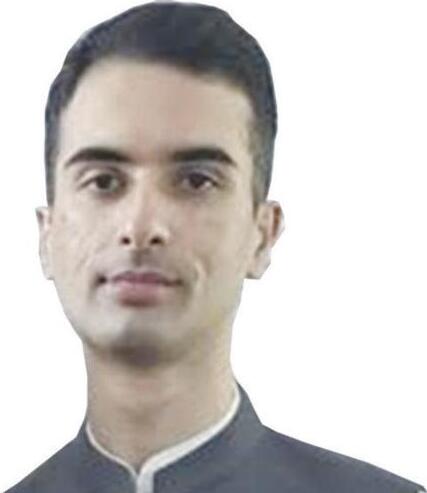

women decline or abandon formal work opportunities Where buses or metro systems exist they remain limited in coverage and often unsafe after dark Ride-hailing services have provided some alternatives, but costs remain prohibitive for low-income workers Without investment in safe, affordable, and reliable transport women’s access to workplaces markets and educational institutions will remain restricted Equally the absence of safe public spaces streets parks and community centres discourages women from engaging in social and economic activity outside the home The debate is not only one of fairness but of macroeconomic necessity Pakistan faces persistent fiscal strain with a tax-to-GDP rati0o hovering around 10 percent and external obligations requiring sustained economic growth Expanding women s recognised and remunerated participation is one of the few levers available to significantly boost national productivity The International Monetary Fund has estimated that raising female labour force participation to the level of men could increase Pakistan s GDP by as much as 30 per cent over the long term
In a country struggling with balance-of-payments crises, this potential cannot be ignored Recognition, however, must go beyond slogans Measuring women’s contribution through regular time-use surveys is a first step ensuring unpaid work is reflected in national accounts Legal frameworks must also evolve to extend protections to home-based and informal workers Pakistan has taken some steps in this direction, such as the Home-Based Workers Policy in Sindh and Punjab, but implementation remains uneven and often lacks adequate funding Expanding such measures nationwide could bring millions of workers into the ambit of social protection
Equally important is investment in care infrastructure Affordable childcare elder care and health services reduce the unpaid care burden that disproportionately falls on women and enable them to participate more fully in formal employment Countries that have invested in such infrastructure have seen not only increased female participation but also improvements in early childhood outcomes and broader social cohesion For Pakistan, where demographic pressures are acute, the long-term benefits could be transformative
At the cultural level, the perception of work itself requires a shift
The assumption that only remunerated labour outside the home qualifies as productive undermines women s contributions Public campaigns educational curricula and workplace policies can all play a role in reshaping how work is understood While policy must provide the scaffolding, societal attitudes ultimately determine whether women’s labour is valued or dismissed
The question that lingers is whether Pakistan can afford to keep its invisible workforce on the margins Economic resilience requires more than infrastructure projects and fiscal adjustments; it requires unlocking the full potential of its people Women, whether in homes, fields, or workshops, are already contributing
The challenge lies in recognising that contribution valuing it and building systems that translate it into sustainable economic growth
Until then the paradox will remain: a country grappling with economic strain while overlooking one of its most significant sources of strength
Suleman Zia is a transnational educational consultant freelance columnist and policy analyst based in Lahore

Lost legacy of education
Saving the game
Women, Labour and Pakistan’s Economy
Suleman Zia

Youth’s Cr y: Voices of protest ignite the Asian Spring
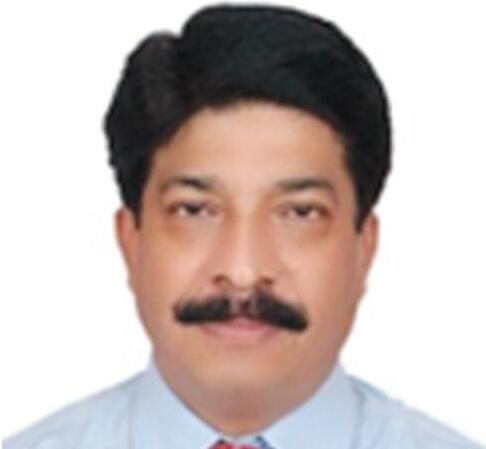

wealth into offshore accounts while public services crumble In Indonesia, price rises of just five percent were enough to fuel discontent among workers already trapped in lowpaid insecure jobs In Nepal the trending hashtag #nepobaby aimed at second-generation politicians handing out contracts to their relatives captured the anger of a generation that sees politics as a closed shop Even Sri Lanka, two years after its Aragalaya movement toppled a dynasty still teeters on the edge of default with debt servicing crowding out social spending What makes these protests possible is the vacuum left by traditional political opposition Once-powerful leftist movements have collapsed or compromised themselves into irrelevance Indonesia’s left was dismantled during Suharto’s dictatorship and never rebuilt Nepal s Maoists who once fought a guerrilla war against the monarchy are now part of the very establishment they once opposed In Sri Lanka, socialist parties drowned themselves in ethnic nationalism, leaving bread-and-butter issues behind Bangladesh’s fragments of the left are weak and sidelined outflanked by religious parties and shadowy military influence With no coherent political alternative young people have stepped into the breach, using their phones as their organizing tools Social media has turned into the lifeline of this resistance A decade ago, Twitter helped spark the Arab Spring Today TikTok Instagram and encrypted apps play the same role In Indonesia videos of a 22-yearold delivery rider Affan Kurniawan crushed under a police truck, spread across the country within hours, transforming isolated rallies into a nationwide uprising In Nepal, when the government tried to cut off access to Meta and X young protesters switched to VPNs and private messaging groups Social media here is not a distraction but the backbone of coordination, solidarity, and political expression Dismissing this generation as
screen-addled misses the point They are the most connected group in history, and they can turn a 15-second clip into a rallying cry Violence often begins not with the protesters but with the state Sri Lankan security forces fired into fuel queues radicalizing ordinary citizens who had simply been waiting for petrol In Bangladesh police and paramilitary forces opened fire on student marches, filling university campuses with bodies In Indonesia, women marched with pink banners and brooms after police beat protesters demanding an end to the brutality In Nepal the first protests were almost festive students handed out water bottles volunteers organized clean-up crews and children waved flags Then police rifles opened fire, and the tone shifted overnight Dozens died at the gates of parliament, and what had been a hopeful demonstration became a bitter confrontation with a corrupt political order Attempts at censorship only make things worse Nepal s blackout, meant to choke off the #nepobaby campaign, sent more young people into the streets Indonesia leaned on TikTok to pull livestreams but clips smuggled out on WhatsApp kept the protests alive Governments blame foreign hands accusing India or the USA of stirring unrest Yet the real causes are domestic: years of graft,

The messag e from Colombo, Dhaka, Jakar ta, and Kathmandu is stark. Young people feel they have been robbed of their futures, and they are no long er willing to wait quietly. They are tearing down the old scripts and writing new ones in real time . Whether their movements harden into sustainable chang e or collapse into chaos will shape not only their countries but the wider world. The choice is not theirs alone . It is also in the hands of those who choose either to listen - or to look away.
scandals expose leaders who funnel state
Guess who the Western sanctions on Iran have crippled?
‘Iran will not kneel’

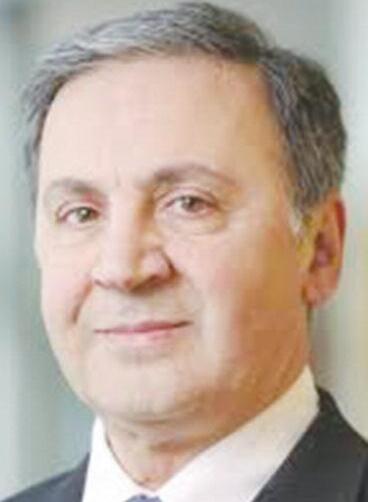
In our peer-reviewed study published by the European Journal of Political Economy, we used a robust methodology to answer this question: We built a “virtual Iran” out of data

IN the decades since the end of the Cold War, a powerful myth has taken hold in the West It is the myth of the “smart” sanction a foreign-policy tool that is supposed to be a clean precise and humane alternative to war The belief is that by skillfully targeting a hostile regime s key revenue sources and finances, one can bring it to heel without harming its citizens
This is a dangerous delusion As our recently published research on Iran reveals the sanctions regime on Iran was far from being a surgical strike; instead it was a sledgehammer that smashed the very group that represents the best hope for a more moderate and stable future – the middle class In this sense, the devastation of the Iranian middle class constitutes a major strategic failure for the West
The rise of Iran’s modern middle class was a century-long process It began under the Pahlavi dynasty with the emergence of a secular, professional class of civil servants, professionals, and managers who built the country s modern infrastructure, funded by oil rents After the 1979 revolution, the Islamic Republic continued to expand the ranks of the middle class lifting millions of previously marginalised families from poverty into a new world of education and opportunity
This educated, empowered class became the political foundation for change It was the power base for the reformist movement of President Mohammad Khatami in the late 1990s It was the faces in the crowds of the 2009 Green Movement and the driving force behind the Woman Life Freedom protests It was the entrepreneurs building a vibrant tech scene from scratch in Tehran, creating local versions of Amazon (Digikala) and Uber (Snapp) that served millions of their fellow citizens This was the engine of a modern Iran looking to the future Sanctions laid waste to it all How can we be so certain this was the fault of sanctions and not just the regime s own chronic mismanagement? To find out, we had to move beyond anecdote and partisan claims
Using a powerful statistical technique called the synthetic control method we created a data-driven twin of Iran: A composite, weighted average of comparable countries like Tunisia, Qatar, Malaysia, Azerbaijan, and Indonesia that mirrored Iran’s economic and social trajectory perfectly before 2012 but was never hit with the international sanctions
This rigorous approach allowed us to see what would have happened in the absence of sanctions, providing a clear, empirical baseline to measure the true damage Although Iran has been a target of various sanctions for more than four decades because of its radical foreign policy the intensity and scale of the new sanctions that were introduced in 2012 were at a much higher level in comparison with the previous years
The results are heartbreaking Starting in 2012, Iran s middle class began to shrink dramatically compared with its sanction-free twin in our model Between 2012-2019, the sanctions caused an average 17 percentage point gap between the potential and actual size of Iran s middle class By 2019 a year after US President Donald Trump launched his maximum pressure campaign against Iran, the cumulative effect was devastating: The middle class was now 28 percentage points smaller than it should have been
These are not abstract numbers These are millions of real people They are the engineers doctors teachers small business owners and retirees who had finally achieved a measure of economic security, only to see it all evaporate under the post-2012 sanctions regime This isn’t just a story told by our model; you can see it in how Iranians see themselves Before the sanctions hit in 2005 a global representative survey (World Value Survey) found that a confident 79 percent of the respondents identified as middle-income They had arrived In early 2020, that number had collapsed to less than 64 percent It is a devastating collapse that economists on the ground in Iran have also confirmed This social decline was not an accident; it was the direct result of predictable economic mechanisms First the sanctions starved the country of the foreign investment needed to create skilled, well-paying jobs The capital that would have built factories and funded tech startups vanished Second they reduced the country’s ability to trade Thousands of small and medium-sized businesses which are the backbone of any healthy society were bankrupted suddenly unable to import essential parts or export their finished goods Finally, and perhaps most cruelly, sanctions
spurred rampant inflation As the currency collapsed, the life savings of families were wiped out For salaried professionals and pensioners on fixed incomes the very core of the middle class this was a catastrophic blow They became the new poor As a result the share of informal employment increased substantially Of course, sanctions did not operate in a vacuum They landed on an economy already hobbled by the Iranian government’s own political corruption and mismanagement Our analysis however explicitly accounts for these pre-existing weaknesses The sanctions acted as a misery multiplier turning a difficult economic situation into an inescapable social catastrophe This is where a story about economics becomes a story of profound injustice A country’s middle class is its source of stability and its most powerful force for moderation It acts as a buffer against extremism advocates for gradual reforms and has the resources to sustain organised political movements
By crushing this group, Western governments didn’t just create hardship; they cleared the field for the very hardliners they claimed to oppose The regime could now plausibly blame all suffering on a foreign enemy while its control over a crippled economy gave it even more power over a desperate population
The ultimate irony of maximum pressure is that it created the perfect conditions for the regime’s most extreme elements to thrive
When people’s primary concern is putting food on the table it is far harder to organise for democratic reform Desperation does not breed democracy; it breeds instability which empowers authoritarians Sanctions were presented as a surgical strike, but in reality, they amounted to economic war against an entire society – and a selfdefeating one at that As sweeping UN sanctions are reimposed on Iran those who pushed for them should ask themselves: Are we making the world a safer place or are we just creating more misery and empowering the very actors that we claim to oppose?
These sanctions are no different from previous ones They are a reckless gamble that will end up punishing the country’s future leaders instead of its current ones
Mohammad Reza Farzanegan has been a Professor of Economics of the Middle East at the Center for Near and Middle Eastern Studies (CNMS) and the School of Business and Economics at Philipps-Universität Marburg Germany since 2012
Nader Habibi is the Henry J Leir Professor of Practice in the Economics of the Middle East at Brandeis University s Crown Center for Middle East Studies
IR A N will not bow to Western pressure and is prepared to defend itself against any threat President Masoud Pezeshkian declared on Monday, signalling a hardening stance as the nation strengthens its military capabilities and regional alliances in response to renewed Western pressure and security threats
Speaking at a ceremony honoring firefighters Pezeshkian delivered his strongest public remarks since taking office, accusing Western powers of hypocrisy and vowing that Iran would never accept humiliation They want to sanction us because we refuse to bow our heads he said The dream of bringing Iran to its knees is nothing but an illusion
Pezeshkian entered office in 2024 promising his voters that he would try to mend ties with the West which have been unprecedentedly contentious in recent years over the dismantlement of the 2015 Iran nuclear deal (the JCPOA) But Western states have increasingly made it difficult for the Iranian President to trust them, after the U S attacked Iran in the middle of negotiations back in June and the E3 (Germany Britain and France) began a process that brought back pre-JCPOA UN sanctions against Tehran this week While Europe and the U S now express a desire to negotiate with Iran Tehran insists the West has squandered every chance for a diplomatic solution over the past year Russia and China the other two signatories to the 2015 deal share this view They argue that the current deadlock began with Washington’s withdrawal from the JCPOA and was exacerbated by the June war and Europe s unconstructive alignment with the U S and Israel Elsewhere in his remarks
Pezeshkian recalled that adversaries never expected Iranians to unite during the twelve days of the U S -Israel aggression in June “They assumed Iran had weakened but the people’s steadfastness upset all their calculations He criticized the American and European politicians who speak of human rights and democracy adding, Take a look at what they re doing in Gaza A regime that has sown chaos in the region has not once been sanctioned in the Security Council because the United States erases decisions with a veto The notion of human rights the United Nations and UNESCO are nothing but lies, the president said, because innocents are being killed before their eyes
Dr imraN KhaliD


Trump’s H-1B c urbs speed US work shif t to India
ers
On Monday, US senators reintroduced a bill to tighten rules on the H-1B and L-1 worker visa programmes, targeting what they called loopholes and abuse by major employers If Trump s visa curbs go unchallenged industry experts expect US firms to shift high-end work tied to AI, product development, cybersecurity, and analytics to their India GCCs, choosing to keep strategic functions in-house over outsourcing
Growing uncertainty fuelled by the recent changes has given fresh impetus to discussions about shifting high-value work to GCCs that many firms were already engaged in “There is a sense of urgency,” said Lalit Ahuja founder and CEO of ANSR which helped FedEx (FDX N) BristolMyers Squibb (BMY N) Target (TGT N) and Lowe s (LOW L) set up their GCCs
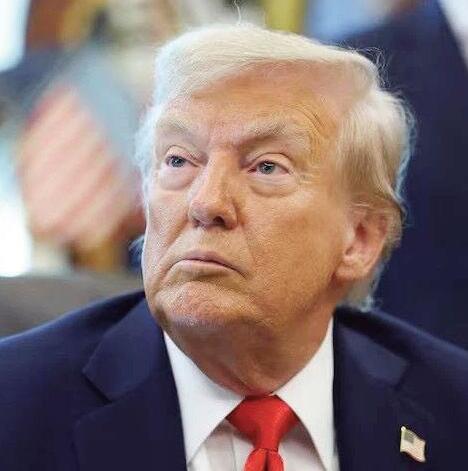
including Amazon (AMZN O) Microsoft (MSFT O) Apple (AAPL O) and Google parent Alphabet (GOOGL-O) along with Wall Street bank JPMorgan Chase (JPM N) and retailer Walmart (WMT N) were among the top sponsors of H-1B
bringing significant disruption in India s exports of services For now we are observing and studying and being ready for outcomes said the India head of a US drugmaker s GCC India-US trade tension has spilled into services from goods with visa curbs and the proposed HIRE Act threatening to reduce India s lower-cost edge and choke cross-border flows of services
Canada formally designates India’s Bishnoi gang as terrorist outfit

a stop to their crimes he said Ottawa emphasised that acts of violence and terror targeting communities to create fear had no place in the country
Canadian officials described the Bishnoi network as a transnational criminal syndicate headquartered in India but with operatives in Canada Bishnoi, imprisoned for over a decade in India is accused of running a network engaged in arms smuggling drug trafficking, extortion and assassinations
Canadian police have previously alleged that Indian intelligence services
exploited Bishnoi-linked operatives to intimidate and attack Sikh activists supporting the Khalistan movement abroad India, however, has dismissed the claims The designation comes amid mounting pressure on Ottawa to curb the gang’s activities particularly after the killing of Sikh leader Hardeep Singh Nijjar in British Columbia in June 2023 Canada accused Indian officials of directing intelligence to criminal organisations like the Lawrence Bishnoi gang to silence critics of the M o d i r
jected Officials said the terrorist designation not only allows seizure of funds and properties but also enhances Canada s ability to disrupt financing, recruitment and international travel of Bishnoi members
Observers note that the move sends a strong political signal to India at a time of
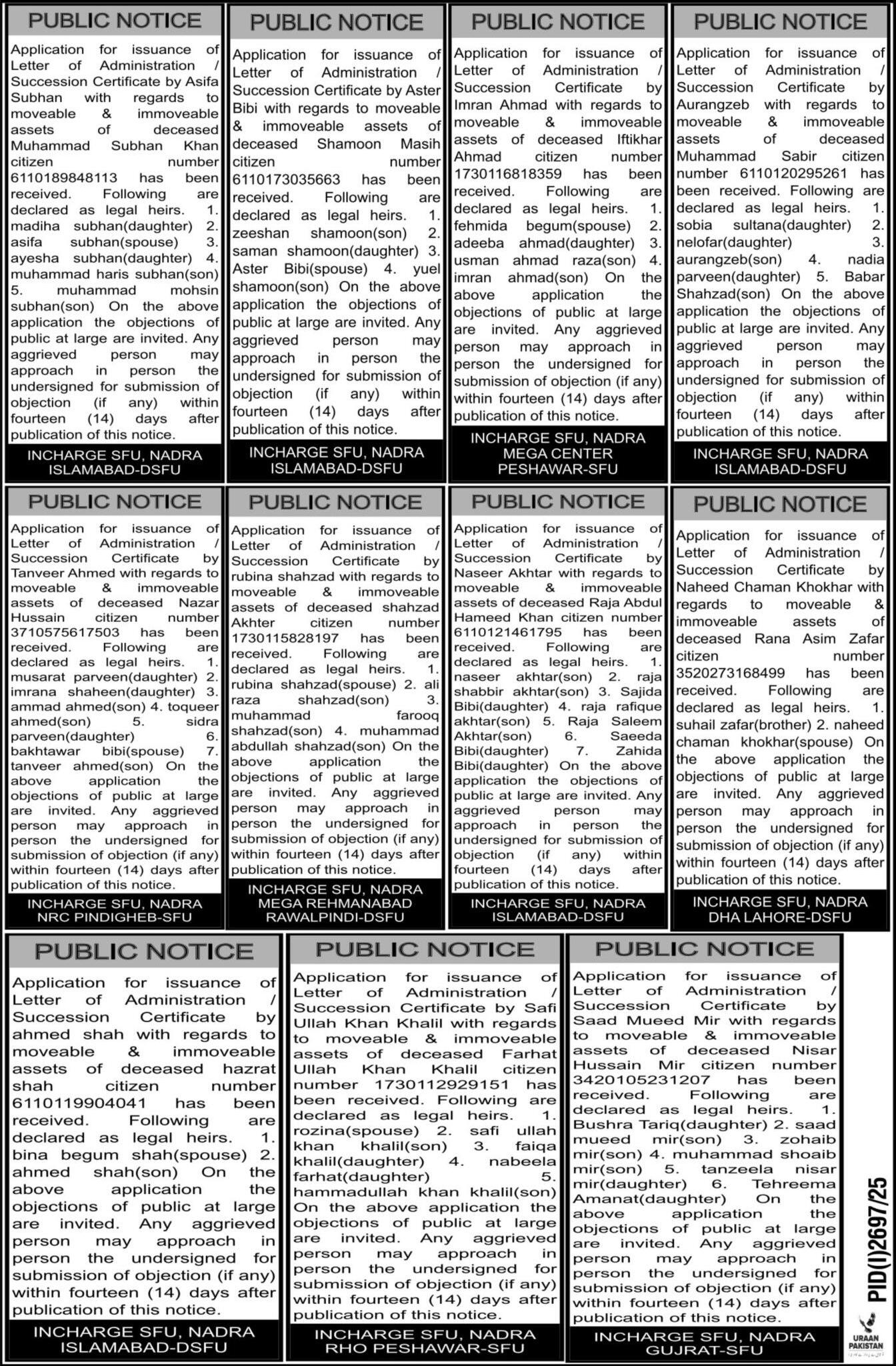

PUNJAB CM VOWS UNPRECEDENTED FLOOD REHABILITATION, OPENS RS640M CENTRE IN CHAKWAL

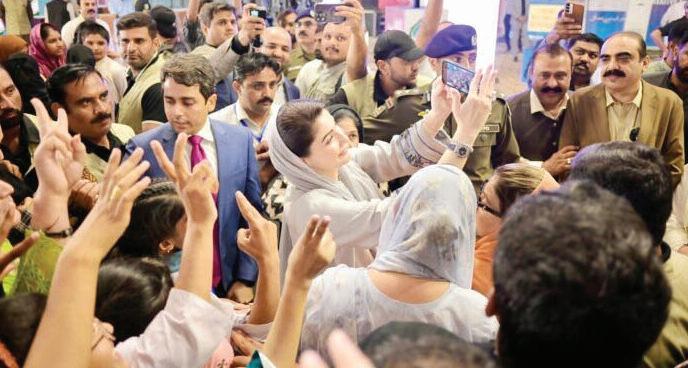
Punjab’s resources, treasur y, and water belong first to Punjab: A zma Bokhari
Punjab Minister for Information and Culture Azma Bokhari strongly rejected recent statements made by PPP leaders terming them baseless and irresponsible She said Punjab s resources treasury and water belong first to the people of Punjab, and only then to anyone else Azma Bokhari said that the PPP is exploiting Punjab’s floods for political gain asking whether this advice had been taken from Narendra Modi She added that it is the PPP itself that is deliberately

and Clean Energy Technologies H E Sardar Awais Ahmed Khan Leghari, Federal Minister for Energy, Government of Pakistan, graced the inaugural ceremony of the event as Chief Guest held at COMSATS University Islamabad (CUI) Ambassadors and diplomats of Palestine Philippines Somalia Syria Sudan and Zimbabwe also attended the inauguration The Federal Minister noted that although Pakistan contributes less than 1% of global emissions, it ranks among the most climate-vulnerable nations “Harnessing our abundant solar wind and hydro potential is a national priority for energy self-sufficiency and sustainability he said He outlined the Government s reforms, including stronger governance through independent boards in distribution companies, steps toward privatization for efficiency, and digitization with smart and advanced metering He added that infrastructure alone is not enough; smart solutions advanced forecasting
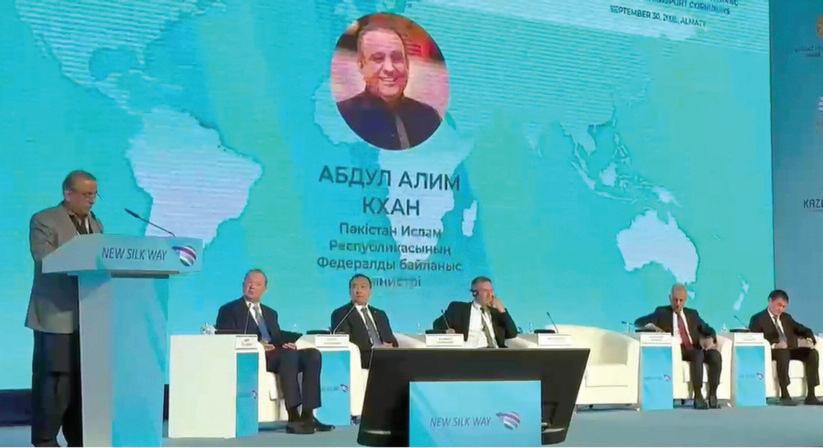
SSGC disconnects 3,000 illegal connections in Shah Latif
Town
KARACHI
s ta f f r e p o r t
The Sui Southern Gas Company s Security Services and Counter Gas Theft Operations Department has increased their efforts to curb the rising incidences of gas theft Recently, in an effort to bring down the mafias operating in Shah Latif Town, Malir, Karachi, the team has been carrying out a grand operation for the past two weeks In a raid carried out near Near Abdullah Goth Shah Latif Town Malir Karachi the team found an illegal connection directly from SSGC s 16 main distribution line via which gas was being supplied to 2,600 households Culprits were taking Rs 20,000/- in advance for providing the illegal connection and Rs 1 500 as monthly payment All illegal connections were dismantled on spot and even after having been attacked by a mob SSGC s teams continued to disconnect all illegal connections FIRs have been lodged against culprits Allah Wadhaya Abbasi S/o Allah Wasaya, Wajid Baloch, Khan Muhammad Buledi, Khair Muhammad Kaleri, Anwer Siyal & Shah Muhammad for providing illegal direct connections to the residents Appropriate claim will be raised accordingly
and deworming campaigns have reached nearly 22 000 and 37 000 animals respectively This effort builds on recent livestock initiatives including a visit by a senior delegation from IUCN Pakistan to Tharparkar this week, where they engaged with local government and Thar Foundation representatives to develop a grazing land management and conservation policy
KE urges adherence to safet y protocol amid monsoon rains, network maintains stabilit y KARACHI staff report
K-Electric (KE) urges citizens to prioritise safety and remain vigilant particularly in areas where waterlogging becomes an issue as moderate to heavy showers broke the spell of heat in the city on Tuesday KE field teams remained on alert to monitor the situation and address any localised issues The network remained stable and at

FA ZL WARNS US AGAINST ‘FORCEFUL POLITICS’ ON PALESTINE
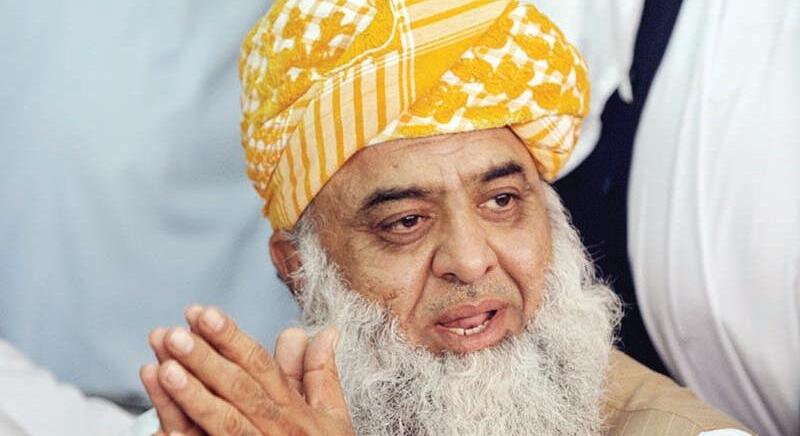
K h A sif ‘guarantees ’ Imran’s sons will not be arrested if visit Pakistan
Internet in Pakistan faces widespread slowdowns
The International Monetary Fund (IMF) does not anticipate major setbacks to Pakistan’s economic growth or revenue collection this fiscal year despite recent floods The Express Tribune reported citing government sources Except for Punjab, provincial authorities have reported limited economic losses, reducing the likelihood of downward revisions to fiscal targets Pakistani authorities have assessed flood-related damage along three rivers while evaluations of infrastructure destroyed or damaged in Punjab remain ongoing During a kick-off meeting with Finance Minister Muhammad Aurangzeb the IMF delegation reviewed initial provincial assessments The governments of Balochistan, Sindh, and Khyber Pakhtunkhwa (K-P) shared their estimates separately
Based on these preliminary inputs the IMF indicated no significant economic losses but said
it would wait for detailed damage assessments The lender also noted that the floods had not impacted tax revenues and urged the Federal Board of Revenue (FBR) to share visible results from its ongoing transformation plan, approved last year and backed with over Rs55 billion for initiatives to improve tax collection
The observations follow Prime Minister Shehbaz Sharif s request that the IMF consider flood impacts during review talks Authorities indicated that contingency funds could cover flood-related expenditures likely avoiding the need for additional resources Pakistan s internal assessments suggest limited economic disruption, with GDP growth still projected between 3 7% and 4%, slightly below the 4 2% target The Planning Commission estimates total flood-related losses at around Rs360 billion roughly 0 3% of GDP Resilient crop yields helped offset losses Punjab s rice and sugarcane sowing exceeded initial projections, mitigating potential
reductions in output The current account deficit is not expected to rise and additional imports due to floods are not projected During separate meetings, the IMF raised concerns over delayed publication of the Governance and Corruption Diagnosis Assessment report Authorities assured the lender the report would be released within the week
The report identifies shortcomings in judicial, administrative, and corporate governance and includes over a dozen recommendations to
